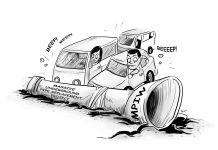
IN A COUNTRY with a rich and at times turbulent history, education is paramount in shaping the collective memory and consciousness of citizens. Education serves as a beacon of truth, enlightenment and critical thinking. However, a recent development raised questions about the Department of Education’s (DepEd) commitment to these ideals. Its memo ordering the removal of “Marcos” from the term “Diktadurang Marcos” is a concerning example of a revisionist approach that threatens to distort historical truths.
Ferdinand E. Marcos Sr., former president of the Philippines, ruled with an iron fist for over two decades, from 1965 to 1986. His regime was marked by human rights abuses, censorship of the press, curtailment of civil liberties, and the plundering of the nation’s coffers. The term “Diktadurang Marcos” accurately encapsulates the authoritarian nature of his rule and the immense suffering endured by Filipinos during his tenure.
DepEd’s order to remove “Marcos” from this term is not only baffling but deeply troubling. It raises concerns about the government’s intent to sanitize history and diminish the atrocities committed during the martial law era. Such actions are reminiscent of authoritarian regimes that manipulate the narrative to maintain their grip on power.
History is not a matter of opinion; it is a record of events, actions, and consequences. Attempting to alter or erase historical facts is a disservice to the Filipino people and future generations. Education should empower individuals to critically examine the past, understand its complexities, and learn from its mistakes. By whitewashing history, we deprive ourselves of this invaluable opportunity.
Furthermore, the memo sends a troubling message to survivors of martial law and their families. It dismisses their suffering and sacrifices and undermines their struggle for justice and accountability. It is a slap in the face to countless activists, journalists and ordinary citizens who resisted Marcos’ tyranny and paid a high price for their courage.
In a democratic society, open and honest dialogue about the past is essential for national healing and reconciliation. This includes acknowledging the dark chapters of our history and holding those responsible for human rights violations accountable. DepEd should play a pivotal role in facilitating these discussions rather than attempting to distort historical facts.
The decision to alter “Diktadurang Marcos” underscores the importance of safeguarding academic freedom and the autonomy of educational institutions. Educators must be allowed to teach history in a manner that is accurate, objective and free from political interference. It is the responsibility of DepEd to support educators in their mission to educate and inform, not to dictate the terms of historical discourse.
It is essential that we remember the lessons of history, even when they are painful, to ensure that the mistakes of the past are not repeated. The Filipino people deserve an education system that respects their intelligence and provides them with the tools to engage in meaningful discussions about their nation’s history. We must not allow revisionism to take root and obscure the truth.







